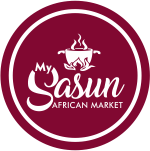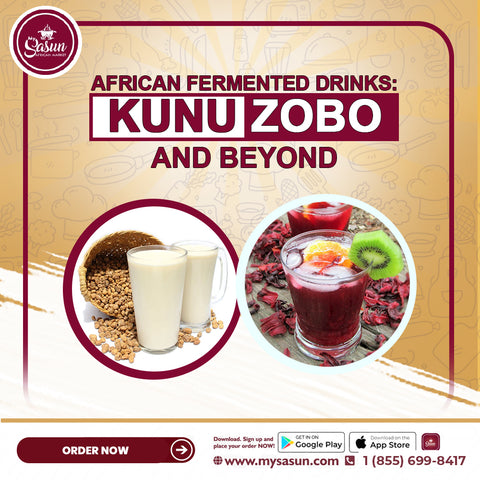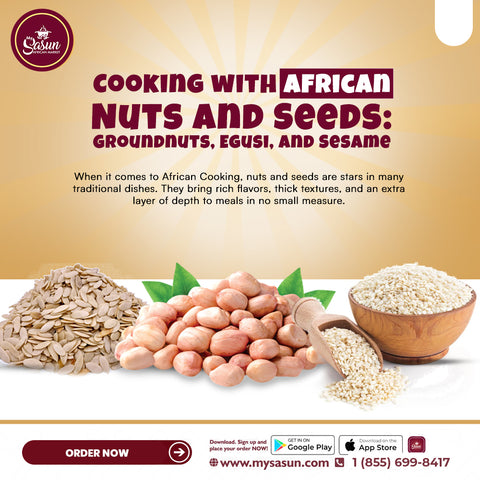When you think of natural African drinks, your mind may immediately go to the sweet, fruity flavors of a chilled Zobo or the warm, spiced richness of Kunu. But these two beverages are just a glimpse into the wide world of African fermented drinks that have not only quenched thirsts for centuries but have also offered rich cultural traditions, vibrant flavors, and numerous health benefits. At My Sasun African Market, we celebrate these unique African beverages that blend history, tradition, and taste into every sip. Let’s dive into the world of Kunu, Zobo, and beyond today!
Also Read: HOW IRU (FERMENTED LOCUST BEANS) IS MADE

What Makes Fermented Drinks Special?
Fermentation is a metabolic process in which organic molecules (such as glucose) are converted into acids, gases, or alcohol in the absence of oxygen. It is carried out by microorganisms like yeast and bacteria and is used to produce substances like lactic acid or alcohol.
This technique is used in many African communities to create refreshing and nutritious beverages. Fermented drinks have been a part of African traditions for centuries, and they offer not just unique flavors but also health benefits like improved digestion, probiotics, and essential vitamins.
Let’s take a closer look at some standout African fermented drinks that you should definitely add to your list.
Also Read: 10 Fermented Foods in West Africa & Their Health Benefits

1. Kunu
Kunu, a fermented grain drink, is a staple in many homes across Nigeria, particularly in the northern region. Traditionally made from grains like millet, sorghum, or maize, Kunu has a mildly sweet and slightly tangy taste that keeps you coming back for more. It’s the perfect companion to a hot day or a heavy meal as it offers a refreshing burst of energy each time.
Kunu preparation begins with soaking the grains for several hours, blending them with spices like ginger and cloves, then straining and leaving them to ferment overnight. The result? A light, delicious drink that’s not only tasty but also loaded with nutrients.
Why You Should Try Kunu:
- The combination of grains and spices gives Kunu a unique, earthy flavor with a subtle kick.
- Rich in fiber, B vitamins, and minerals, Kunu is known to aid digestion, improve hydration, and boost energy levels.
Also Read: 15 Porridges and Puddings from the Heart of Africa

2. Zobo
If there’s one African drink that stands out for its stunning color, it’s Zobo. Known in many parts of the world as hibiscus tea, Zobo is a popular West African drink made from dried hibiscus petals. The drink is typically sweetened with sugar and flavored with ginger, cloves, pineapple, or citrus fruits to create a bold and tangy beverage that’s perfect for cooling down in the heat.
Zobo is especially popular in Nigeria, Ghana, and other parts of West Africa. Beyond its refreshing taste, Zobo is ahigly nutritious as it’s packed with vitamin C, antioxidants, and minerals like iron and calcium.
Why You Should Try Zobo:
- With a vibrant red color and tangy, slightly sweet taste, Zobo offers a refreshing alternative to your usual fruit juices.
- Zobo is famous for lowering blood pressure, improving digestion, and being rich in antioxidants that fight free radicals.
- You can enjoy Zobo hot or cold, and it pairs wonderfully with a variety of meals, making it a versatile drink for any occasion.
Also Read: How to Make the Perfect Pap/Akamu/Ogi

Beyond Kunu, Zobo: Other Fermented Drinks
Africa’s fermented drinks don’t stop at Kunu and Zobo. Here are a few more regional specialties worth exploring:


Also Read: Garri Ijebu: Beyond a Staple Food



Also Read: Top 14 West African Foods for Gut Health and Digestive Wellne



Also Read: ALL YOU NEED TO KNOW ABOUT PAP/AKAMU
Why You Should Explore African Fermented Drinks
At My Sasun African Market, we believe in showcasing these authentic, time-honored beverages because they offer more than just refreshment. With each sip, you’re tasting history, health, and the vibrancy of African communities.
Whether you’re interested in trying Kunu, Zobo, or something more adventurous like palm wine or mahewu, we’ve got you covered at My Sasun African Market. We offer a wide range of traditional African ingredients and beverages to bring the authentic taste of Africa right to your doorstep.
Let us know—what’s your favorite African drink? Are you team Kunu or a Zobo lover? Share your thoughts and let’s keep the conversation about African food culture alive!
Also Read: 17 Popular Beverages from Nigeria







Comments (111)
I want to share my experience of getting rid of my herpes with no side effects, thanks to Dr.OGBO. I was diagnosed with herpes 5 years ago and was taking medications, but I wasn’t satisfied with the results. I started looking for possible cures and came across a comment about Dr. OGBO and his herbal medicine. I contacted him, and he guided me through the process. He prepared the herbs, shipped them to me with instructions and dosage, and I took the medicine as prescribed. After a few days, I did a blood test twice, and the results came out negative. I was completely cured of herpes. I am so grateful to Dr. OGBO for all he did. If you need help with herbal remedies, you can contact him via email at drogboherbalhome@gmail.com, call/ WhatsApp him at +2349057657558
Welcome to Good Life Bitcoin Trading
I am a bitcoin professional trader, and I always win my trade with my best
trading platform, so are you looking for a professional trader or looking for
someone that can help you invest and trade your Bitcoin for more profit to be
made? With and 8 hours of investment profit plans.
Do you know you can grow your money by investing in Bitcoin and get profit by
helping you to trade, Email us for more info melodygoodlife617@gmail.com
My investment plans;
Invest $250 X 8=$2,000
Invest $500 X 8=$4,000
Invest $1,000 X 8=$8,000
Invest $1,500 X 8=$12,000
Invest $,2,000 X 8=$16,000
Invest $3,000 X 8=$24,000
Contact us today let’s teach you how you can get that done with proof on my
trading platform by investing and make your profit in 8-Hours..
E-mail Address: melodygoodlife617@gmail.com
Melody Good Life.
A Try We Convince You With Good Life Investment.
FOR CRYPTOCURRENCY RECOVERY, CONTACT TSUTOMU SHIMOMURA
This is the best crypto recovery company I’ve come across, and I’m here to tell you about it. TSUTOMU SHIMOMURA was able to 5:15 PM 30/11/2025 RIGHT GHH recover my crypto cash from my crypto investment platform’s locked account. TSUTOMU SHIMOMURA just needed 24HRS to restore the $620,000 I had lost in cryptocurrencies. I sincerely appreciate their assistance and competent service. TSUTOMU SHIMOMURA may be relied on since they are dependable and trustworthy. You can also contact them via Email: tsutomushimomurahacker@gmail.com Or WhatsApp +1 (806) 283-5031 Telegram +1 (803) 632-0791 and I’m sure you will be happy you did.
At first i never thought it will happen until i gave it a try, because i have been hearing people saying it and my life has been like a hell in a cell having this herpes virus in my body. thank you so much for your unwavering dedication, and life-changing impact on my health. Your holistic approach to healing not only cured my herpes virus but also restored my faith in the power of natural medicine. Your personalized care, deep knowledge of herbal remedies, and compassionate guidance have been nothing short of miraculous in my healing journey.
Your commitment to providing effective and sustainable solutions goes above and beyond expectations. The way you attentively listened to my concerns, meticulously crafted a treatment plan, and continuously supported me through every step of the process has truly transformed my life. Your healing hands and compassionate heart have made a lasting impression on me, leaving me forever grateful for the positive changes you have brought into my life. Today i will like to use this medium to say a big THANK YOU and also recommend him to everyone suffering from HERPES, HEPATITIS, CANCER, KIDNEY FAILURE, BARRENESS, HIV AIDS, HSV1, HSV2, WEAK ERECTION, LOW SPERM COUNT, LUPUS, SKIN CANCER you can reach him on his Email: drkuriamaherbalhome@gmail.com
WhatsApp: +2349069653609
website https://onetouchkuriamaherbal.weebly.com
I am Dr. Ayo Christopher, I am a Great traditional Herbal Medicine Doctor. I specialize in treating any kind of diseases and infections using Herbs Medicine. I have the Herbal Cure for Diabetes, Virginal infection, Genital, Gonorrhea, warts virus infections, Leukemia, Breast Cancer, Lung Cancer, Menopause, Hepatitis A B C and HIV and other deadly infections. I have treated more than 20 patients that have Herpes (HSV 2) and all of them were cured. My herbal medicine is 100% safe, there are no side effects and You will start seeing clear results as early as 7 days.
If you have been taking conventional medicines for that Herpes infection and you are still having those re-occurring outbreaks, why don’t you try Herbal Medicines and see it get cured in weeks. For more information, send me an
Email: ridvid8@gmail.com
Telegram: @wafri01
websitehttps:
https://ridvid8.wixsite.com/dr-ayo-herbs-home/about-5
This is my greatest experience. I will be so greedy if I keep this testimony to myself without sharing for the world to see the great work Chief Ade did in my life after making me win the 14 million lottery jackpot with his powerful spell within 24hours. I’m Karine Sirois from Canada. I contacted Chief Ade through Daniel Chau post I saw on a blog, I explained to Chief Ade what I wanted regarding to winning the lottery, and he assured me that he would give me the winning numbers to win the lottery, and he truly gave me some numbers after 24hours and he directed me on how to play which i followed his instructions, it was a great surprise the next day when Loto-Quebec called me to let me know I won the top prize, I will never forget this experience, Chief Ade is reachable chiefadespellhome@gmail.com || WhatsApp +234 901 380 6328 you will never regret contacting Chief Ade
I would never have believed that cold sore herpes virus can be cured with ancient herbal medicine because I just tested negative for the second time since I finished drinking the medicine a herbal doctor sent to me, all the sores and blisters were gone immediately I started drinking the herbal meds, so I want you all to know that herpes virus can be cured with the right use of ancient herbal medicine so visit this herbalist called doctor excel on his Email: drahonsie00@gmail.com
WhatsApp: +2348039482367
https://drahonsie002.wixsite.com/dr-ahonsie
FINALLY FREE FROM HERPES VIRUS
I thought my life had nothing to offer anymore because life became meaningless to me because I had HERPES VIRUS, the symptoms became very severe and bold and made my family run from and abandon me so they won’t get infected. I gave up everything, my hope, dreams,vision and job because the doctor told me there’s no cure. I consumed so many drugs but they never cured me but hid the symptoms inside me making it worse. I was doing some research online someday when I came across testimonies of some people of how Dr.Akhimien cured them from HERPES VIRUS, I never believed at first and thought it was a joke but later decided to contact him on the details provided and when I messaged him we talked and he sent me his herbal medicine and told me to go for a test after two weeks. Within 9 days of medication the symptoms disappeared and when I went for a test Lo and behold I was NEGATIVE by the Doctor Who tested me earlier. Thank you Dr.Akhimien because I forever owe you my life and I’ll keep on telling the world about you. If you are going through same situation worry no more and contact DR Akhimien via website: https://drakhiniemodion.wixsite.com/drakhimien
or email: drakhiniemodion@gmail.com ,his
WhatsApp him via +2349133157031
FINALLY FREE FROM HERPES VIRUS
I thought my life had nothing to offer anymore because life became meaningless to me because I had HERPES VIRUS, the symptoms became very severe and bold and made my family run from and abandon me so they won’t get infected. I gave up everything, my hope, dreams,vision and job because the doctor told me there’s no cure. I consumed so many drugs but they never cured me but hid the symptoms inside me making it worse. I was doing some research online someday when I came across testimonies of some people of how Dr.Akhimien cured them from HERPES VIRUS, I never believed at first and thought it was a joke but later decided to contact him on the details provided and when I messaged him we talked and he sent me his herbal medicine and told me to go for a test after two weeks. Within 9 days of medication the symptoms disappeared and when I went for a test Lo and behold I was NEGATIVE by the Doctor Who tested me earlier. Thank you Dr.Akhimien because I forever owe you my life and I’ll keep on telling the world about you. If you are going through same situation worry no more and contact DR Akhimien via website: https://drakhiniemodion.wixsite.com/drakhimien
or email: drakhiniemodion@gmail.com ,his
WhatsApp him via +2349133157031
FINALLY FREE FROM HERPES VIRUS
I thought my life had nothing to offer anymore because life became meaningless to me because I had HERPES VIRUS, the symptoms became very severe and bold and made my family run from and abandon me so they won’t get infected. I gave up everything, my hope, dreams,vision and job because the doctor told me there’s no cure. I consumed so many drugs but they never cured me but hid the symptoms inside me making it worse. I was doing some research online someday when I came across testimonies of some people of how Dr.Akhimien cured them from HERPES VIRUS, I never believed at first and thought it was a joke but later decided to contact him on the details provided and when I messaged him we talked and he sent me his herbal medicine and told me to go for a test after two weeks. Within 9 days of medication the symptoms disappeared and when I went for a test Lo and behold I was NEGATIVE by the Doctor Who tested me earlier. Thank you Dr.Akhimien because I forever owe you my life and I’ll keep on telling the world about you. If you are going through same situation worry no more and contact DR Akhimien via website: https://drakhiniemodion.wixsite.com/drakhimien
or email: drakhiniemodion@gmail.com ,his
WhatsApp him via +2349133157031